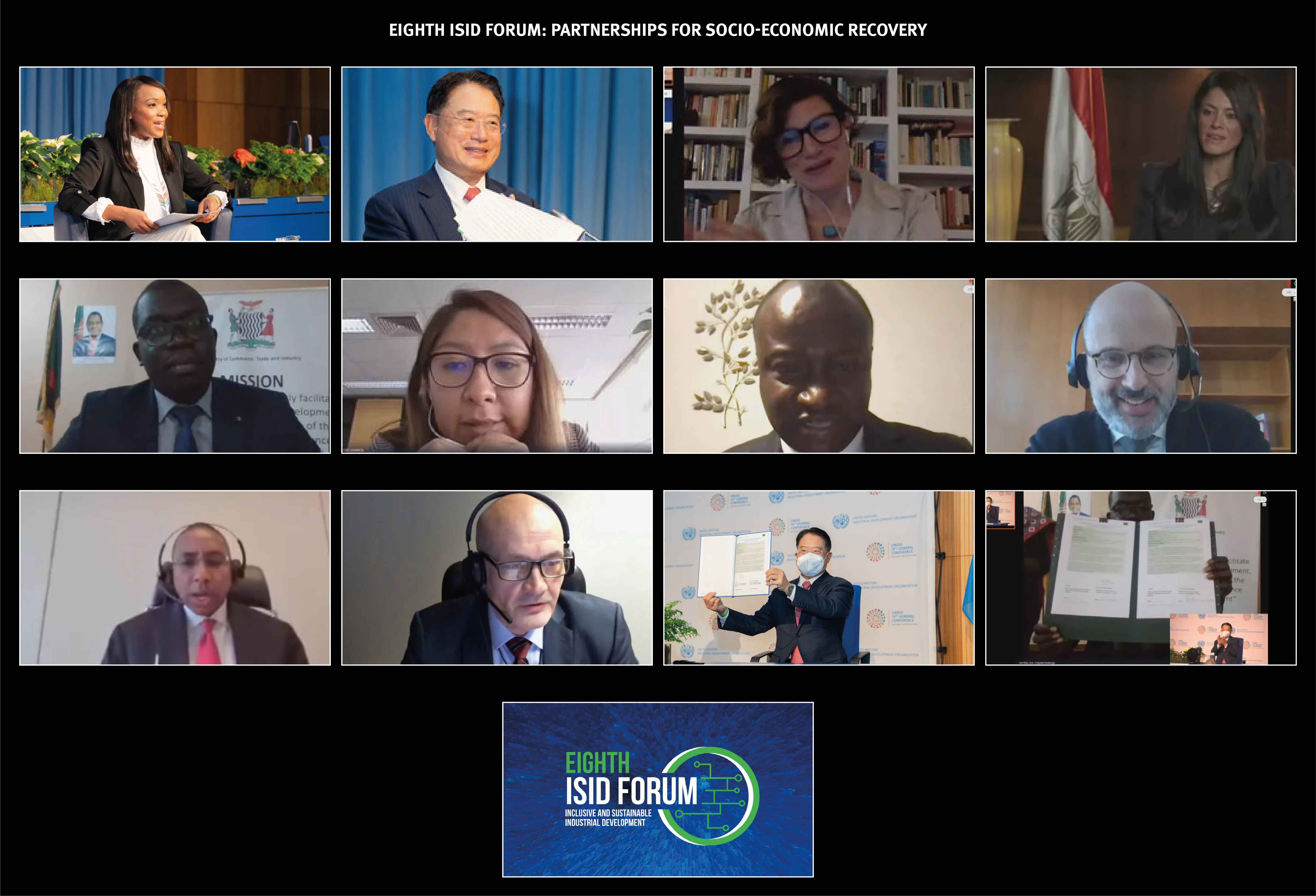Partnerships for socio-economic recovery: focus of UNIDO’s Eighth ISID Forum
29 November 2021

VIENNA, 29 November 2021 – The United Nations Industrial Development Organization (UNIDO) today held its Eighth Inclusive and Sustainable Industrial Development (ISID) Forum. The Forum discussed how multi-stakeholder approaches, such as the UNIDO Programme for Country Partnership (PCP), can support socio-economic recovery and countries’ efforts to build a better future, in the context of the United Nations’ Decade of Action.
In his opening remarks, UNIDO Director General LI Yong said, “What we have seen, more than ever, in this interconnected world, is that no single country or entity can address the pandemic on its own, let alone reboot progress towards our shared Sustainable Development Goals (SDGs). What we face together, we must solve together,” adding, “UNIDO will continue to support multilateral and country efforts to build back better through integrated approaches, combining our technical expertise, policy advice, normative support, and convening function, including through our partnership-centered PCPs.”
There are currently 12 PCP countries − Cambodia, Côte d’Ivoire, Ethiopia, Egypt, Kyrgyzstan, Morocco, Nigeria, Peru, Rwanda, Senegal, Tanzania and Zambia − at different stages of development and implementation.
In her keynote speech at the ISID Forum, Mariana Mazzucato, Professor at the University College London (UCL) and Founding Director of the UCL Institute for Innovation and Public Purpose, emphasized, “We need governments to take a leading role in building, coordinating and governing horizontal, cross-sectoral partnerships.” She continued, “Whether it is climate change or the digital divide, none of these areas can be solved in isolation. We need every sector to be part of the solution when we think of the future of industrial policy and recovery.”
High-level government representatives presented their insights and first-hand experiences with the UNIDO PCP approach. Rania Al-Mashat, Egypt’s Minister of International Cooperation, said, “The PCP is a very important framework for the Government of Egypt; it shows country ownership, collaboration and coordination, especially through its governance, led by the President and supported by the Prime Minister, bringing together different ministries and other international institutions to create complementarity.”
Chipoka Mulenga, Zambia’s Minister of Commerce, Trade and Industry, emphasized his government’s national commitment to the PCP as it prepares to launch the implementation of the new programme.
As part of the closing segment of the ISID Forum, the Minister and Director General Li officially signed the finalized PCP Zambia programme document, marking an important milestone.
Government representatives from Senegal and Peru talked about their priority initiatives, from industrial policy to circular economy and the establishment of industrial zones and agro-poles, noting the partnerships and resources mobilized through the PCP over the years. Ethiopia and Cambodia also delivered messages of support to UNIDO’s PCP approach at the occasion of the ISID Forum.
Development partners and financial institutions shared their experiences and views, highlighting the essence of multi-stakeholder partnerships for socio-economic recovery and progress towards the SDGs.
Robert Piper, Assistant Secretary General for Development Coordination at the United Nations, spoke about the PCP’s contribution to UN system-wide efforts at the country-level in support of governments and their path towards the 2030 Agenda, notably in the context of the UN reform. “The PCP responds to the thirst for more emphasis on economic transformation, for a whole-of-society and multi-stakeholder approach, and it is innovative, as it mobilizes funds from different sources and promotes a more integrated model of development, a cross-cutting effort. It also draws on all assets of the UN family.”
Representing the African Development Bank, Abdu Mukhtar, noted the multi-dimension impacts of COVID-19, but also emphasized the growth opportunities when talking about the Bank’s priorities, such as the development of industrial value chains, the pharmaceutical sector and sustainable infrastructure development. On the PCP, he said, “There is clear alignment between the Bank’s industrialization strategy and the PCP approach. The AfDB benefits from UNIDO’s expertise in industrial policy design and large-scale industrial projects, such as industrial parks and agro-poles. We are active partners in the PCPs of Egypt, Ethiopia, Morocco, Tanzania and Senegal.”
Antti Karhunen from the European Commission underlined the long-standing partnership between the European Union and UNIDO, including in PCP countries. “For us, the PCP is a very valuable tool that can help leverage the complementary resources and initiatives of various partners, including from the private sector.” He also presented some of the EU’s initiatives in support of socio-economic recovery, such as Investing in Young Businesses in Africa and support to local manufacturing, notably in the health sector.
The Forum was moderated by Folly Bah Thibault, Principal Presenter, Al Jazeera English, and held in a hybrid format as part of the nineteenth session of the UNIDO General Conference.
Find out more about the event’s speakers and panellists on the webpage here.
For more information on the Programme for Country Partnership, please contact:
Jaime Moll de Alba
Director
Department of Programme and Partnership Coordination
Related press release – UNIDO and the Government of the Republic of Zambia sign the Programme for Country Partnership